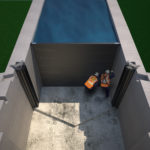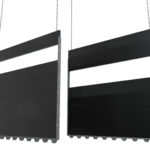New stoplog design from ECS reduces weight and improves durability
Throughout the water and wastewater industries, stoplogs are used for level control and to provide a safe and secure working area when carrying out maintenance operations on water control devices. In the main these are fabricated from steel in order to provide the required strength to hold large volumes of water at bay. ECS Engineering Services is now offering a more durable, engineered alternative using fibre reinforced polymer (FRP).
ECS has a long history and considerable expertise in designing and fabricating water control devices, including lock gates, sluice gates and tilting weirs. As a framework contractor for the Environment Agency, ECS is frequently called upon to refurbish sections of the water control infrastructure across the country and this often involves the use of stoplogs.
Following a recent agreement for the company to have the exclusive rights to install a range of FRP products produced by FiberCore Europe, ECS has also been approved to deliver a range of stoplog designs using this innovative material. These new products will complement the existing steel fabrication services and wide range of water control devices already offered by ECS.
The majority of water control structures, such as sluices and lock gates, are unique in their dimensions and so if a set of stoplogs is required they are generally built to order and designed specifically for a particular location. In addition, due to the locations of these structures, the stoplogs are usually stored in the open, exposed to the elements.
Clearly, since maintenance engineers rely on the stoplogs to hold back the water, these essential devices must be properly maintained to prevent any corrosion or damage to the seals caused by the weather.
The use of fibre reinforced polymers or composites is not new, but FiberCore Europe has developed a dedicated technology , known as Infracore® Inside, that enables FRP structures to be used in load bearing structures, in many cases without additional steel reinforcement. This technology has enabled the company to design and build bridges, bridge decks and lock gates using FRP.
The new FRP stoplog design will have a number of advantages over the traditional steel construction:
- Greatly improved durability with excellent resistance to corrosion and UV
- Considerably lighter than steel, greatly reducing the capacity of lifting equipment required
- Little or no maintenance requirement
- An expected design life of 100 years and a 50 year warranty
The new stoplog designs will be engineered to fit each specific location and where necessary they can be adapted to fit existing structures, minimising the installation time for the project. In addition, both the delivery time and cost are comparable with the traditional steel structures, as well as the knowledge that FRP is less attractive to metal thieves.
For more information on this and many other services available from ECS visit the website: www.ecsengineeringservices.com
- Bespoke designs ensure new stoplogs fit existing structures
- The new stoplog design is considerably lighter than steel, reducing lifting requirements on site







